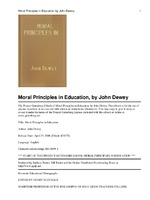Moral Principles in Education
Abstract
Moral Principles in Education By John Dewey Includes; The Moral Purpose of the School, The Moral Training Given by the School Community, The Moral Training from Methods of Instruction, The Social Nature of the Course of Study, The Psychological Aspect of Moral Education, John Dewey was an American philosopher, psychologist, and educational reformer whose ideas have been influential in education and social reform. Dewey is one of the primary figures associated with philosophy of pragmatism and is considered one of the founders of functional psychology. A well-known public intellectual, he was also a major voice of progressive education and liberalism. Although Dewey is known best for his publications concerning education, he also wrote about many other topics, including epistemology, metaphysics, aesthetics, art, logic, social theory, and ethics. Known for his advocacy of democracy, Dewey considered two fundamental elements—schools and civil society—as being major topics needing attention and reconstruction to encourage experimental intelligence and plurality. Dewey asserted that complete democracy was to be obtained not just by extending voting rights but also by ensuring that there exists a fully formed public opinion, accomplished by effective communication among citizens, experts, and politicians, with the latter being accountable for the policies they adopt.** [C:\Users\Microsoft\Documents\Calibre Library]
Collections
- Libgen [81666]

